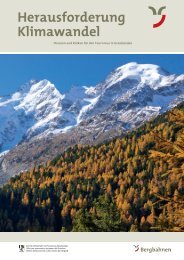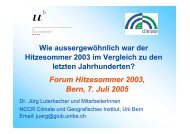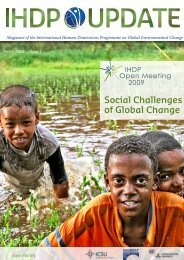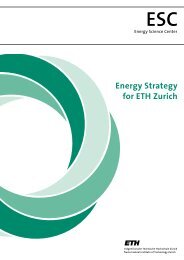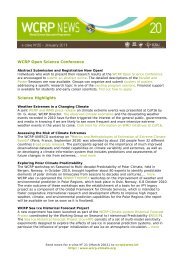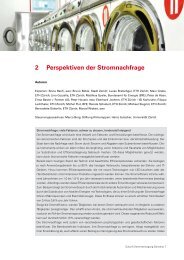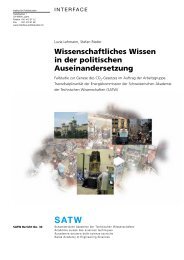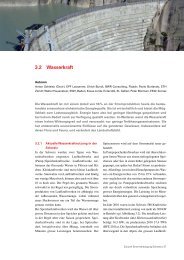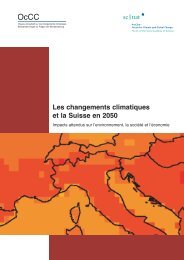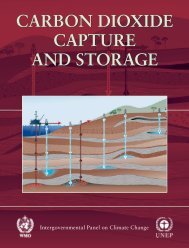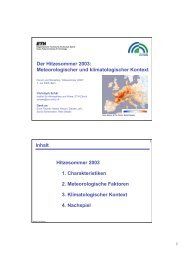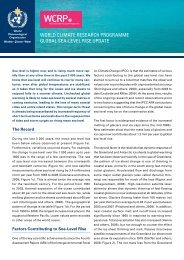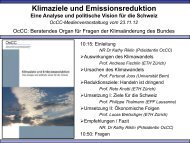Global Change Abstracts The Swiss Contribution - SCNAT
Global Change Abstracts The Swiss Contribution - SCNAT
Global Change Abstracts The Swiss Contribution - SCNAT
You also want an ePaper? Increase the reach of your titles
YUMPU automatically turns print PDFs into web optimized ePapers that Google loves.
<strong>Global</strong> <strong>Change</strong> <strong>Abstracts</strong> – <strong>The</strong> <strong>Swiss</strong> <strong>Contribution</strong> | Human Dimensions<br />
08.1-408<br />
Does the current Clean Development Mechanism<br />
(CDM) deliver its sustainable development<br />
claim? An analysis of officially registered<br />
CDM projects<br />
Sutter C, Parreno J C<br />
Switzerland<br />
Economics , Meteorology & Atmospheric Sciences<br />
This article presents an analytical framework for<br />
analyzing Clean Development Mechanism (CDM)<br />
projects in terms of their contribution to employment<br />
generation, equal distribution of CDM<br />
returns, and improvement of local air quality. It<br />
assesses 16 officially registered CDM projects with<br />
regard to whether they fulfill the two objectives<br />
required by the Kyoto Protocol: greenhouse gas<br />
emission reductions and contribution to sustainable<br />
development in the host country. While a<br />
large part (72%) of the total portfolio’s expected<br />
Certified Emission Reductions (CERs) are likely to<br />
represent real and measurable emission reductions,<br />
less than 1% are likely to contribute significantly<br />
to sustainable development in the host<br />
country. According to our analysis, there are currently<br />
no UNFCCC registered CDM projects that<br />
are likely to fulfill the Kyoto Protocol’s twofold objective<br />
of simultaneously delivering greenhouse<br />
gas (GHG) emission reduction and contributing to<br />
sustainable development.<br />
Climatic <strong>Change</strong>, 2007, V84, N1, SEP, pp 75-90.<br />
08.1-409<br />
Technology in climate policy and climate models<br />
- Introduction<br />
Thalmann P<br />
Switzerland<br />
Modelling , Instruments & Instrumentation , Meteorology<br />
& Atmospheric Sciences , Political Sciences<br />
Energy Policy, 2007, V35, N11, NOV,<br />
pp 5263-5266.<br />
08.1-410<br />
Perceptions and evaluations of biosphere<br />
reserves by local residents in Switzerland and<br />
Ukraine<br />
Wallner A, Bauer N, Hunziker M<br />
Switzerland<br />
Social Sciences , Ecology<br />
In a cross-cultural study perceptions of local<br />
people living in the surroundings of biosphere reserves<br />
in Switzerland and Ukraine were examined<br />
using the method of qualitative interviews. In<br />
the UNESCO Biosphere Entlebuch in Switzerland<br />
people stated that they hoped for a better regional<br />
economic development due to the existence of<br />
the biosphere reserve. However, at the same time<br />
193<br />
people feared further restrictions regarding landuse.<br />
In the Carpathian Biosphere Reserve located<br />
in Transcarpathia/Ukraine people tended to connect<br />
certain conditions - such as the high price for<br />
wood - directly to the existence of the biosphere<br />
reserve, when in fact these conditions and the<br />
biosphere reserve were separate, parallel developments.<br />
In both case studies three key-categories<br />
influencing local residents’ perceptions and evaluations<br />
of biosphere reserves could be identified.<br />
<strong>The</strong>se categories are (1) the economic situation, (2)<br />
the history of nature protection, and (3) the power<br />
balance between the involved stakeholders. Paying<br />
close attention to those three categories will<br />
help planners and managers of protected areas to<br />
better understand the reasoning of local residents<br />
for or against a biosphere reserve in their area.<br />
Landscape and Urban Planning, 2007, V83, N2-3,<br />
NOV 19, pp 104-114.<br />
08.1-411<br />
<strong>The</strong> concept of sustainable development - consequences<br />
for social theory. Research desiderata<br />
and a proposal for a research strategy in<br />
social geography<br />
Zierhofer W<br />
Switzerland<br />
Economics , Social Sciences<br />
<strong>The</strong> concept of sustainable development - consequences<br />
for social theory. Research desiderata and<br />
a proposal for a research strategy in social geography<br />
According to the mainstream of modern<br />
social sciences, nature and environment are opposed<br />
to the social and not regarded as part of the<br />
disciplinary object field. This view is profoundly<br />
challenged by the regulative idea of sustainable<br />
development, since it urges reconciliation of ecological,<br />
economic and social demands. This paper<br />
discusses the state of the art of integrating nature,<br />
environment or the biophysical world into<br />
the basics of social theory. It shows further that<br />
so far the relations between society and environment<br />
have so far not been sufficiently conceptualized<br />
on the level of collective or aggregated interactions,<br />
and thus the macro-level of social theory.<br />
In respect of this research desideratum, the paper<br />
presents a research strategy, which sets out from<br />
the concept of “ecological regimes”.<br />
Erdkunde, 2007, V61, N3, JUL-SEP, pp 239-247.



